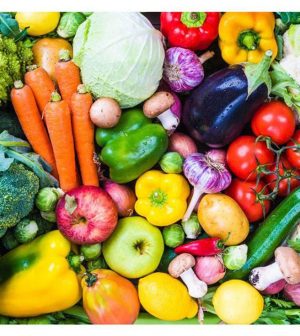- Recognizing the Signs of Hypothyroidism
- 10 Strategies to Overcome Insomnia
- Could Artificial Sweeteners Be Aging the Brain Faster?
- Techniques for Soothing Your Nervous System
- Does the Water in Your House Smell Funny? Here’s Why
- Can a Daily Dose of Apple Cider Vinegar Actually Aid Weight Loss?
- 6 Health Beverages That Can Actually Spike Your Blood Sugar
- Treatment Options for Social Anxiety Disorder
- Understanding the Connection Between Anxiety and Depression
- How Daily Prunes Can Influence Cholesterol and Inflammation
Want That Healthy Skin Glow? These Foods Can Get You There

Eating foods high in five key nutrients can help you have soft, glowing, healthy skin, an expert says.
Omega-3s: While they’re typically associated with brain and heart health and lower blood pressure, they also “can reduce inflammation and keep your skin moisturized,” clinical dietitian Margaret Ifarraguerri, of LifeBridge Health’s Sinai Hospital of Baltimore, said in a Lifebridge news release.
Omega 3s are found in fatty fish like salmon, mackerel, tuna, herring and sardines and also in flaxseed, chia seeds and walnuts.
Vitamin C: The body needs vitamin C to produce collagen, a protein that helps heal wounds, and it’s essential for skin cell production, Ifarraguerri said.
Some of the best sources of vitamin C are citrus fruits such as oranges and grapefruit as well as tomatoes, berries, bell peppers and kiwi fruit.
Vitamin A: This antioxidant “is essential in promoting skin cell growth” and can help protect the skin from ultraviolet (UV) damage, especially during spring and summer when the sun’s UV rays are most intense.
You’ll find good amounts of vitamin A in green, leafy vegetables (including broccoli), carrots, sweet potatoes and squash.
Vitamin E: This vitamin also acts as an antioxidant and can protect against UV damage. Vitamin E deficiency has also been linked with dry skin.
Foods rich in vitamin E include almonds, hazelnuts and peanut butter. Vegetable oils, including safflower, sunflower and wheat germ oils, are other good sources.
Zinc: This mineral “is an essential nutrient for wound healing” and keeping the skin healthy, according to Ifarraguerri.
Baked beans, pork and beef are among good food sources of zinc, and oysters have more zinc per serving than any other food.
Most of your nutrients should come from food and beverages, nutrition experts say. Ask your doctor and dietitian about your specific nutritional needs and how best to address them, Ifarraguerri advised.
More information
The American Academy of Dermatology has more on skin care.
SOURCE: Lifebridge Health, news release, Aug. 12, 2021
Source: HealthDay
Copyright © 2026 HealthDay. All rights reserved.










